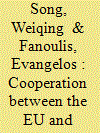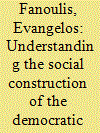| Srl | Item |
| 1 |
ID:
183715


|
|
|
|
|
| Summary/Abstract |
The European Union's partnership with China has received significant academic attention. Experts have focused on both parties’ economic and political objectives and have made efforts to grasp the dynamics of the institutionalisation of EU-China cooperation. However, little has been said about how this collaboration affects the lives of citizens, especially in China. Adopting a Foucauldian epistemology, this article's key contention is that EU-China cooperation imposes a joint form of post-liberal governmental power on the Chinese population, which socially constructs empowered but not liberal political subjectivities for Chinese citizens. The article first reviews Foucault's approach to governmentality. It then explores Sino-EUropean collaboration after 2013, when the two partners established the ‘EU-China 2020 Strategic Agenda for Cooperation’. We illustrate how the institutionalisation of the partnership has been consistent with a governmentalised political rationality, and how policy implementation has allowed a post-liberal form of governmental power to flow from both EU and Chinese policymakers towards the Chinese population, triggering processes of political subjectivisation.
|
|
|
|
|
|
|
|
|
|
|
|
|
|
|
|
| 2 |
ID:
134067


|
|
|
|
|
| Publication |
2014.
|
| Summary/Abstract |
Drawing upon the Foucauldian approach of governmentality, this article argues that the democratic deficit of the EU's Common Security and Defence Policy (CSDP) is the outcome of how governmental power flows in CSDP governance and more precisely within the governance practices of the policy. To support this argument, the narrative explores the secrecy/confidentiality, informality and normalisation of the exercise of governmental power in a concrete example of CSDP governance, the recent pooling and sharing initiative. The example shows that the official makers of CSDP pursue efficiency of governance to the detriment of the democratic quality of the policy, and this is related with the productive and expansive rationality of governmental power flowing in and between the EU institutions. Despite the fact that governmentality usually links to structural explanations, allowing limited space for the role of agency in politics, the article concludes with reflections on how the political agency of the governing EU political subjects contributes to the social construction of the democratic deficit of CSDP.
|
|
|
|
|
|
|
|
|
|
|
|
|
|
|
|